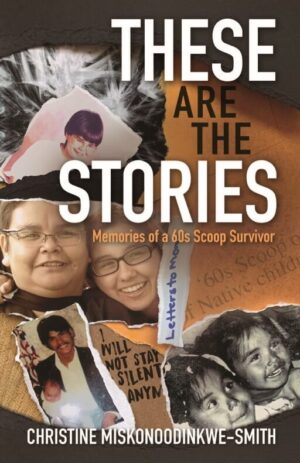Read an Excerpt from Silence to Strength
From the 1960s through the 1980s the Canadian Children’s Aid Society engaged in a large-scale program of taking First Nations children from their families and communities and adopting them out to non-Indigenous families. This systemic abduction of untold thousands of children came to be known as the Sixties Scoop. Stories of the intergenerational disruption from loss of family and culture are shared in this collection, as are stories of strength and survivance.
In Silence to Strength: Writings and Reflections on the 60s Scoop, editor Christine Miskonoodinkwe Smith gathers together contributions from seventeen Sixties Scoop survivors from across the territories of Canada. These courageous writings show there is strength in telling story, and power in ending the silences of the past.
TEACHING RESOURCE ON THE SIXTIES SCOOP AVAILABLE FOR EDUCATORS. Contact Kegedonce Press.
The contributors to Silence to Strength are: Anna Croxen, Vonda Knipfel, Shaun LaDue, Alice McKay, Denise Mcleod, Christine Miskonoodinkwe Smith, David Mortimer, Arlene Noskye, Karen Orser, Doreen Parenteau, Shane Pement, Tyler Pennock, Cathy Phannenhour, Elizabeth Redsky, Terry Swan, Melissa Thomas (Sigvaldason), and Lisa Wilder.
COVER ART: Miigwetch to George Littlechild for sharing his powerful artwork, “Horse Spirit, Helper, Brother” (2011) for the cover.
Praise for Silence to Strength:
“Here is the strength and the beauty of Indigenous adoptees telling our own stories, our own truths—all different, all connected, all vitally important. Kisâkihitin my cousins, you are not alone. Even though we were isolated and made to feel alone on this journey, these stories are shared by tens of thousands of us. Keep telling your truths, keep insisting on being heard. The power and pain of trying to find our way back home needs to register; Canada needs to listen.”
—Lisa Bird-Wilson, author of Probably Ruby.
“Indigenous adoptees give voice to the thousands of stolen children in Silence to Strength: Writing and Reflections on the Sixties Scoop. Ensuring that healing continues for other survivors, their gift of truth and remembrance is immeasurable. Each one rising above their negative experiences is a remarkable statement of who we are as Indigenous people; we are still here, we are home, we have a future. Silence to Strength describes how searching and reclaiming one’s birth family is a long difficult journey, wrought with pain and grief and that truth and reconciliation is about finding their truth and at best recreating their family and community. ‘Standard operating practices of CAS agencies,’ were illegal thefts of children, who were deemed invalid, erasable, blank slates. Indigenous adoptees were caught in a system of assimilation policies and the pressures put on Canadian parents to make Indian children into white children. Many of them rebelled and found their way back to their people. Their stories bring Indigenous voice and vision to the center of reclamation and rebuilding. In the era of truth and reconciliation, we must listen with our hearts and minds. What can we do today, to advocate for children caught in these systems of non-care? If we are to change our society for the better, we must hear their stories if we truly care.”
— Dr. Brenda Wastasecoot, author of Showing and Telling the Story of Nikis (My Little House)
“This collection of stories from sixties scoop survivors is heartfelt, deep, truthful, and positive. Writing personal stories of early trauma and loss are medicinal: seeing your story written by you is medicine that leads the way. It takes courage, perseverance, and support, to stay the journey. Christine Miskonoodinkwe Smith, a sixties scoop survivor herself, provides space for other survivors to write, and tell their own stories, for the healing aspect of what this process accomplishes – ‘to let out the pain that we hold inside.’ Reading through the veils of colonial silence/violence, to the strength that propels one onward, I thought of Blood memory – a kind of genetic memory that flows through the generations. Asking questions of one’s life story leads to asking many more. These stories of survival all speak of hope; hope that their stories will reach others silenced by their past, and give them strength to open the doors to their own healing journey.”
—Atik Bird, author of The Percy Papers






Reviews